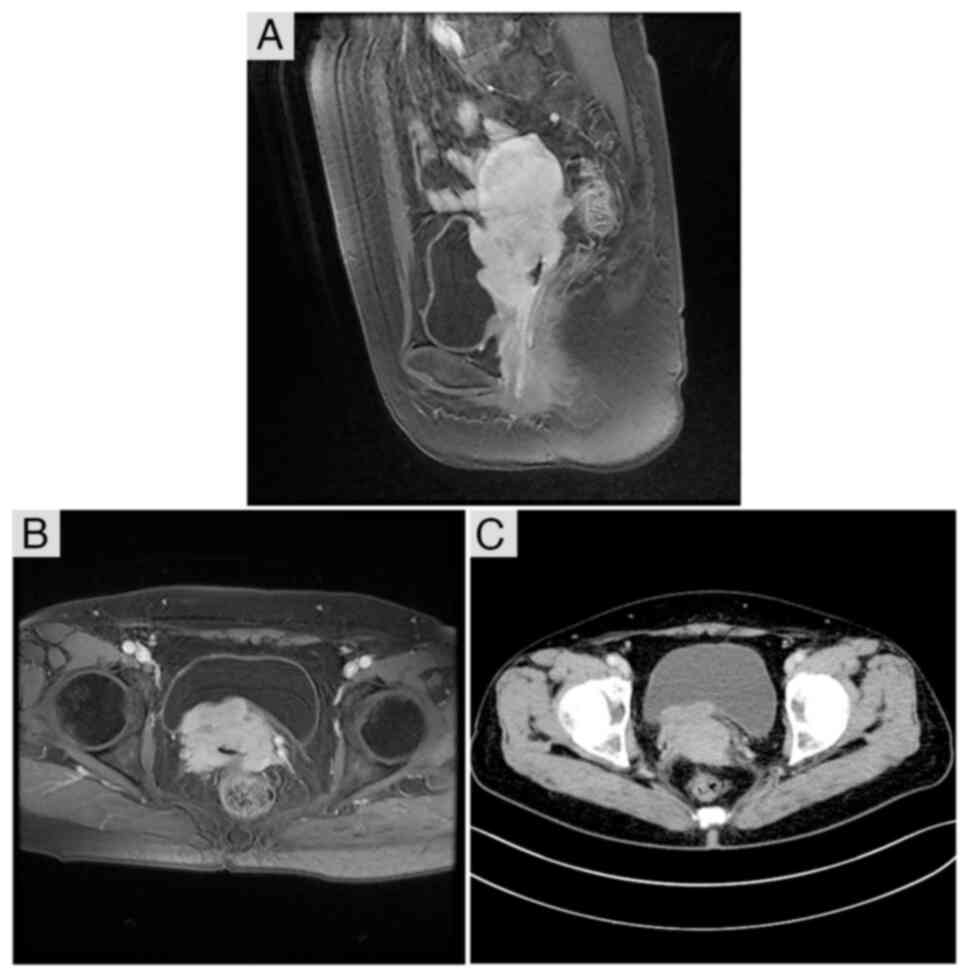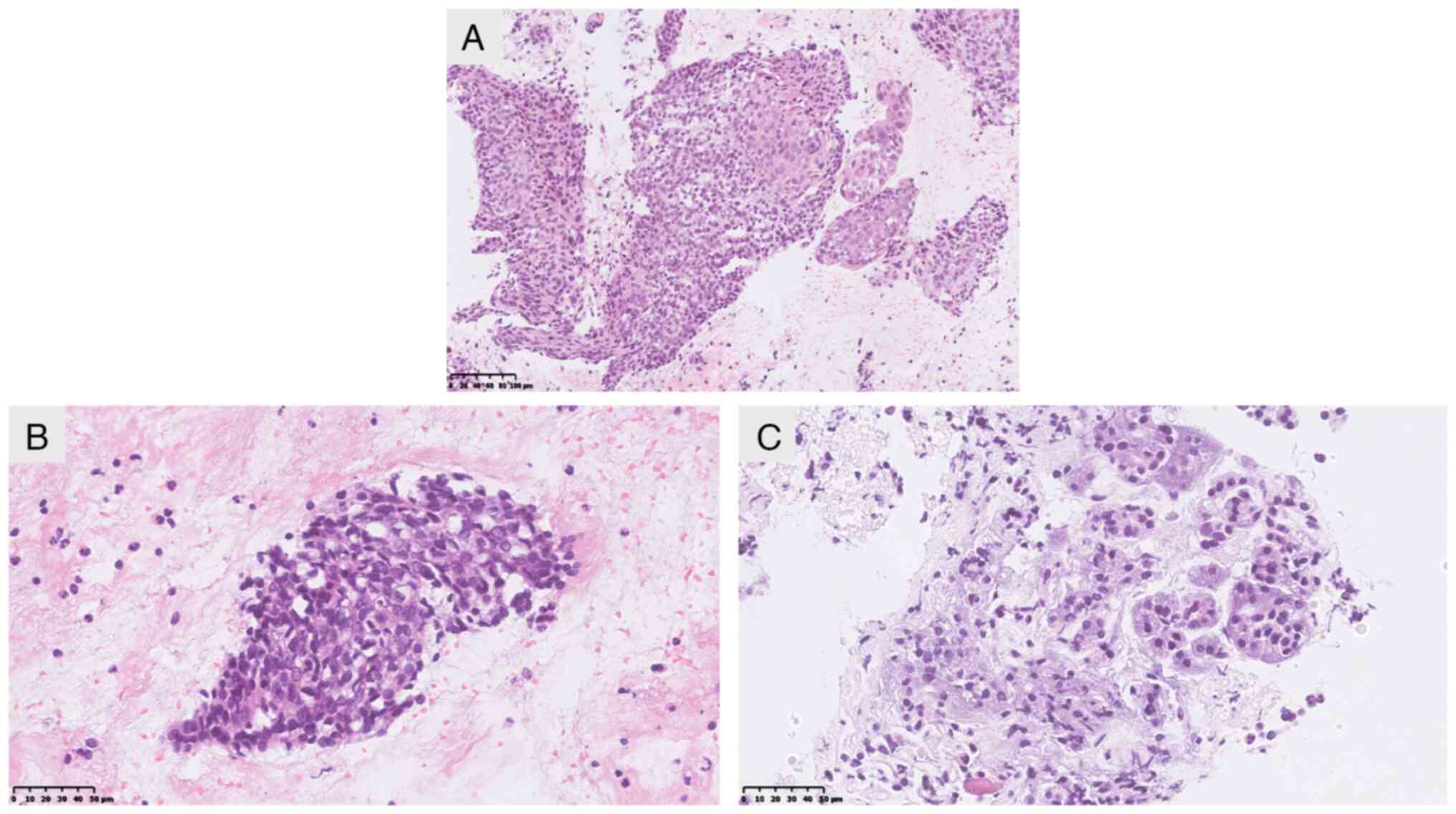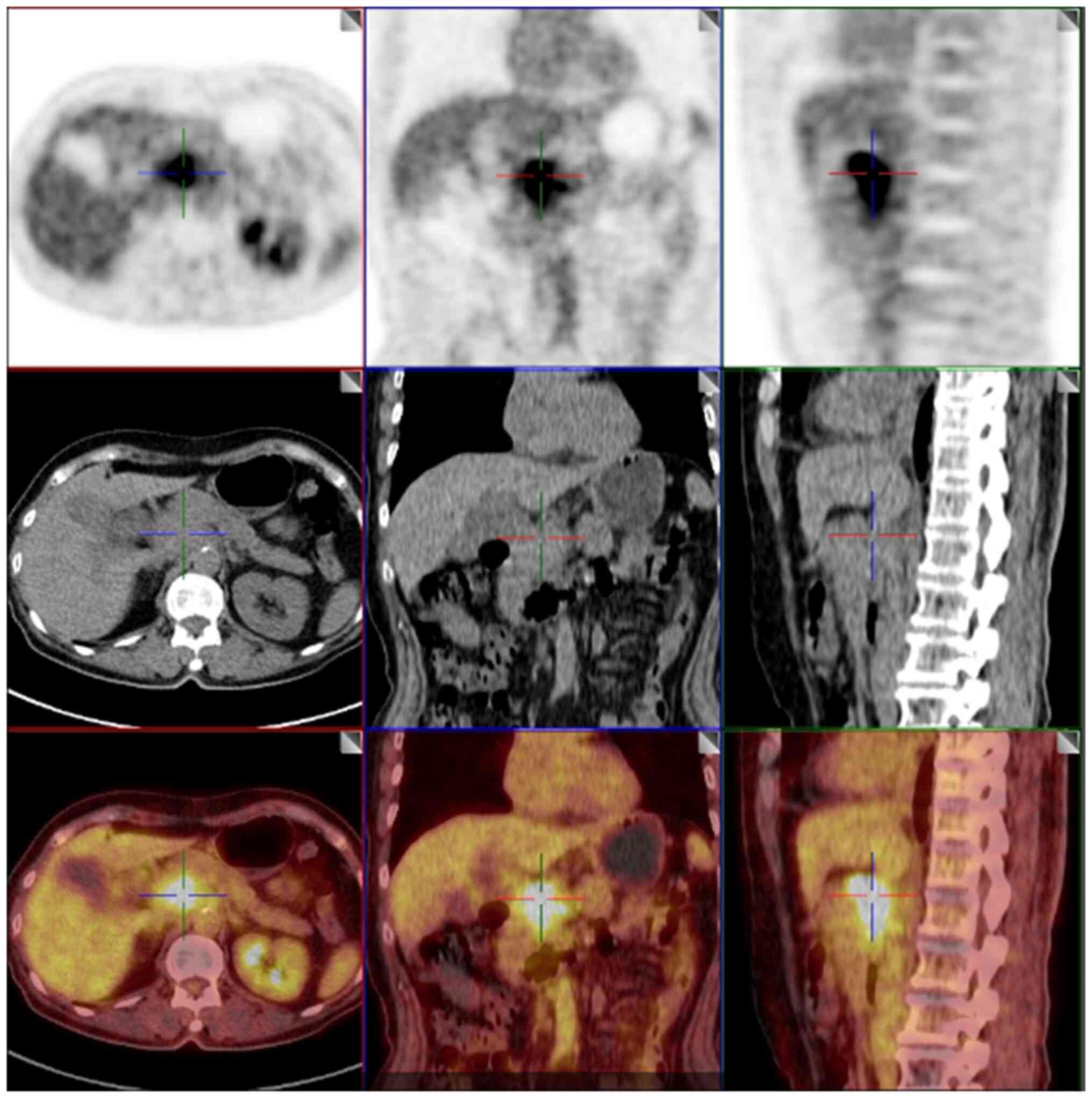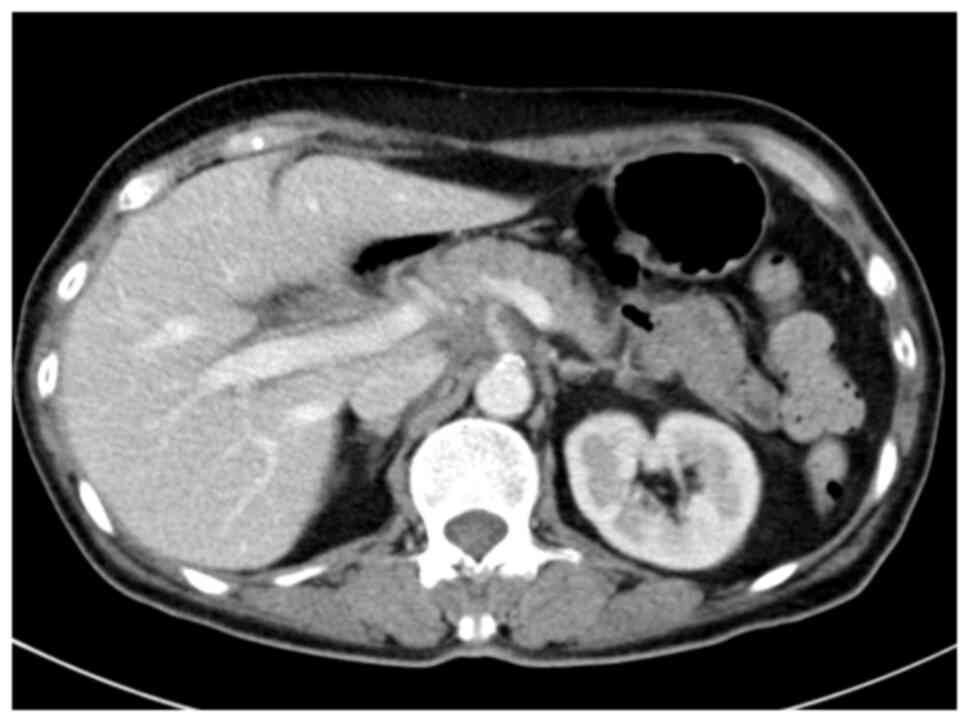|
1
|
Xie H, Kong B and Duan T: Obstetrics and
Gynaecology. 1st edition. People's Health Press; Beijing: pp.
p2982018
|
|
2
|
Gadducci A, Guerrieri ME and Cosio S:
Adenocarcinoma of the uterine cervix: Pathologic features,
treatment options, clinical outcome and prognostic variables. Crit
Rev Oncol Hematol. 135:103–114. 2019. View Article : Google Scholar : PubMed/NCBI
|
|
3
|
Shen J, Feng XS, Wen H, Zhou C, Mo M, Wang
Z, Yuan J, Wu X and Zheng Y: Metastatic characteristics and
survival analysis of 572 patients with distant metastases of
cervical cancer: A hospital-based real-world study. Chin J Cancer.
34:361–367. 2024.
|
|
4
|
Ballarin R, Spaggiari M, Cautero N, De
Ruvo N, Montalti R, Longo C, Pecchi A, Giacobazzi P, De Marco G,
D'Amico G, et al: Pancreatic metastases from renal cell carcinoma:
The state of the art. World J Gastroenterol. 17:4747–4756. 2011.
View Article : Google Scholar : PubMed/NCBI
|
|
5
|
Tsitouridis I, Diamantopoulou A,
Michaelides M, Arvanity M and Papaioannou S: Pancreatic metastases:
CT and MRI findings. Diagn Interv Radiol. 16:45–51. 2010.PubMed/NCBI
|
|
6
|
Ogawa H, Tsujie M, Miyamoto A, Yasui M,
Ikenaga M, Hirao M, Fujitani K, Mishima H, Tsujinaka T and Nakamori
S: Isolated pancreatic metastasis from uterine cervical cancer: A
case report. Pancreas. 40:797–798. 2011. View Article : Google Scholar : PubMed/NCBI
|
|
7
|
Geraizadeh B, Kashkooe A, Nikeghbalian S
and Malek-Hosseini SA: Metastatic tumors to the pancreas: A single
center study. Arch Iran Med. 22:50–52. 2019.PubMed/NCBI
|
|
8
|
Reddy S, Edil BH, Cameron JL, Pawlik TM,
Herman JM, Gilson MM, Campbell KA, Schulick RD, Ahuja N and
Wolfgang CL: Pancreatic resection of isolated metastases from
nonpancreatic primary cancers. Ann Surg Oncol. 15:3199–3206. 2008.
View Article : Google Scholar : PubMed/NCBI
|
|
9
|
Pecorelli S: Revised FIGO staging for
carcinoma of the vulva, cervix, and endometrium. Int J Gynecol
Obstet. 105:103–104. 2009. View Article : Google Scholar : PubMed/NCBI
|
|
10
|
National Cancer Institute, . SEER: Cancer
Stat Facts: Cervical Cancer. https://seer.cancer.gov/statfacts/html/cervix.html4–5.
25
|
|
11
|
Sathishkumar K, Chaturvedi M, Das P,
Stephen S and Mathur P: Cancer incidence estimates for 2022 and
projection for 2025: Result from national cancer registry
programme, India. Indian J Med Res. 156:598–607. 2022. View Article : Google Scholar : PubMed/NCBI
|
|
12
|
Budukh AM, Dikshit R and Chaturvedi P:
Outcome of the randomized control screening trials on oral, cervix
and breast cancer from India and way forward in COVID-19 pandemic
situation. Int J Cancer. 149:1619–1620. 2021. View Article : Google Scholar : PubMed/NCBI
|
|
13
|
Stelzle D, Tanaka LF, Lee KK, Khalil AI,
Baussano I, Shah ASV, McAllister DA, Gottlieb SL, Klug SJ, Winkler
AS, et al: Estimates of the global burden of cervical cancer
associated with HIV. Lancet Glob Health. 9:e161–e169. 2021.
View Article : Google Scholar : PubMed/NCBI
|
|
14
|
Han SY and Kong WM: Pathological
characteristics and changes of cervical cancer. Hebei Medical
Journal. 42:1414–1417+1421. 2020.(In Chinese).
|
|
15
|
Crafton SM, Venkat PS and Salani R: A
review of the state of cervical cancer: Updates from prevention to
recurrent disease. Curr Opin Obstet Gyencol. 36:28–33. 2023.
View Article : Google Scholar : PubMed/NCBI
|
|
16
|
Jaén-Torrejimeno I, López-Guerra D,
Rojas-Holguín A, De-Armas-Conde N and Blanco-Fernández G: Resection
of isolated pancreatic metastases from pulmonary neoplasia: A
systematic review. Updates Surg. 74:1817–1825. 2022. View Article : Google Scholar : PubMed/NCBI
|
|
17
|
Page MJ, McKenzie JE, Bossuyt PM, Boutron
I, Hoffmann TC, Mulrow CD, Shamseer L, Tetzlaff JM, Akl EA, Brennan
SE, et al: The PRISMA 2020 statement: An updated guideline for
reporting systematic reviews. BMJ. 372:n712021. View Article : Google Scholar : PubMed/NCBI
|
|
18
|
Wastell C: A solitary secondary deposit in
the pancreas from a carcinoma of the cervix. Postgrad Med J.
42:59–61. 1966. View Article : Google Scholar : PubMed/NCBI
|
|
19
|
Chung JJ, Namiki T and Johnson DW:
Cervical cancer metastasis to the scalp presenting as alopecia
neoplastica. Int J Dermatol. 46:188–189. 2007. View Article : Google Scholar : PubMed/NCBI
|
|
20
|
Kuwatani M, Kawakami H, Asaka M, Marukawa
K, Matsuno Y and Hosaka M: Pancreatic metastasis from small cell
carcinoma of the uterine cervix demonstrated by endoscopic
ultrasonography-guided fine needle aspiration. Diagn Cytopathol.
36:840–842. 2008. View
Article : Google Scholar : PubMed/NCBI
|
|
21
|
Mahajan S and Pandit-Taskar N: Uncommon
metastasis to the pancreas from adenocarcinoma of the cervix
detected on surveillance 18F-FDG PET/CT imaging. Clin Nucl Med.
42:e511–e512. 2017. View Article : Google Scholar : PubMed/NCBI
|
|
22
|
Lee EJ, Hwang J and Kim DW: Small-cell
neuroendocrine carcinoma of the uterine cervix with pancreatic
metastasis: A case report and a review of the literature. J Obstet
Gynaecol. 39:573–575. 2019. View Article : Google Scholar : PubMed/NCBI
|
|
23
|
Gupta PK, Lal P and Tiwari A: A case
report of carcinoma of uterine cervix throwing heterochronous
metastasis to the skin, spleen, and pancreas: The role of
multimodality treatment approach. J Egypt Natl Cancer Inst.
31:82019. View Article : Google Scholar
|
|
24
|
Kim DJ, Park JM, Kim JH, Nam K, Kang CD,
Lee SJ, Lee K and Jeon YH: Pancreatic metastasis from
adenocarcinoma of the uterine cervix. Korean J Gastroenterol.
73:182–185. 2019. View Article : Google Scholar : PubMed/NCBI
|
|
25
|
Datta D, Aggarwal D, Balakrishnan S,
Varshney VK and Kumar R: Metastasis from cervical cancer presenting
as a pancreatic head mass-an unexpected diagnosis! J Gastrointest
Canc. 54:300–303. 2022. View Article : Google Scholar
|
|
26
|
Kopke Túlio MACB, Horta MSF, BispoMC S,
Costa TSNBE and Chagas CMDBR: Pancreatic Metastases as the Initial
Manifestation of a Neuroendocrine Carcinoma of the Uterine Cervix.
Pancreas. 47:e4–e5. 2018. View Article : Google Scholar : PubMed/NCBI
|
|
27
|
Nishimura C, Naoe H, Hashigo S, Tsutsumi
H, Ishii S, Konoe T, Watanabe T, Shono T, Sakurai K, Takaishi K, et
al: Pancreatic metastasis from mixed adenoneuroendocrine carcinoma
of the uterine cervix: A case report. Case Rep Oncol. 6:256–262.
2013. View Article : Google Scholar : PubMed/NCBI
|
|
28
|
Liu AL, Feng Y and Zhao Y: Pancreatic
metastasis of complex small cell neuroendocrine carcinoma of
cervix: A case report and literature review. Gastroenterology.
23:638–640. 2018.
|
|
29
|
Nakajima Y, Iwasaki E, Kayashima A,
Machida Y, Kawasaki S, Horibe M, Kawaida M, Masugi Y, Iwata T and
Kanai T: Successful radiotherapy for recurrent obstructive
pancreatitis secondary to pancreatic metastasis from cervical
squamous-cell carcinoma. Clin J Gastroenterol. 16:755–760. 2023.
View Article : Google Scholar : PubMed/NCBI
|
|
30
|
Ye H, Yi XL and Li XH: A case report of
obstructive jaundice due to pancreatic metastasis from squamous
cervical carcinoma. J Clin Hep Dis. 38:646–648. 2022.
|
|
31
|
Akers A, Read S, Feldman J, Gooden C and
English DP: Diagnostic challenges and individualized treatment of
cervical adenocarcinoma metastases to the breast: A case report.
World J Clin Cases. 12:412–417. 2023. View Article : Google Scholar : PubMed/NCBI
|
|
32
|
Choi TW, Kim SH, Shin CI, Han JK and Choi
BI: MDCT findings of pancreatic metastases according to primary
tumors. Abdom Imaging. 40:1595–1607. 2015. View Article : Google Scholar : PubMed/NCBI
|
|
33
|
Ardengh JC, Lopes CV, Kemp R, Venco F, de
Lima-Filho ER and dos Santos JS: Accuracy of endoscopic
ultrasound-guided fine-needle aspiration in the suspicion of
pancreatic metastases. BMC Gastroenterol. 13:632013. View Article : Google Scholar : PubMed/NCBI
|
|
34
|
Tella SH, Kommalapati A, Yadav S,
Bergquist JR, Truty MJ, Durgin L, Ma WW, Cleary SP, McWilliams RR
and Mahipal A: Survival and prognostic factors in patients with
pancreatic squamous cell carcinoma. Eur J Surg Oncol. 45:1700–1705.
2019. View Article : Google Scholar : PubMed/NCBI
|
|
35
|
Makarova-Rusher OV, Ulahannan S, Greten TF
and Duffy A: Pancreatic squamous cell carcinoma: A population-based
study of epidemiology, clinicopathologic characteristics and
outcomes. Pancreas. 45:1432–1437. 2016. View Article : Google Scholar : PubMed/NCBI
|
|
36
|
Kim NI and Lee JS: Greater specificity of
p40 compared with p63 in distinguishing squamous cell carcinoma
from adenocarcinoma in effusion cellblocks. Cytojournal. 17:132020.
View Article : Google Scholar : PubMed/NCBI
|
|
37
|
Bao H, Zhao Y, Zhang X, Bi H, Cong S, Fang
L, Wang HJ and Wang L: HPV-negative high-grade cervical
precancerous lesions or invasive cancer in China: A post hoc
analysis of a multicentric clinical study. Int J Gynecol Obstet.
161:159–167. 2022. View Article : Google Scholar
|
|
38
|
Paya A, Alenda C, Perez-Carbonell L, Rojas
E, Soto JL, Guillén C, Castillejo A, Barberá VM, Carrato A,
Castells A, et al: Utjlity Of p16 immunohistochemistry for the
identification of Lynch syndrome. Clin Cancer Res. 15:3156–3162.
2009. View Article : Google Scholar : PubMed/NCBI
|
|
39
|
Shafique M, Shoaib I, Aslam B, Khalid R,
Tanvir I, Rasool MH, Shah TA, Almaary KS, Bourhia M and Qamar MU:
Detection of high-risk human papillomavirus infected cervical
biopsies samples by immunohistochemical expression of the p16 tumor
marker. Arch Microbiol. 206:172023. View Article : Google Scholar : PubMed/NCBI
|
|
40
|
Mou H, Yu L, Zheng X, Liao Q, Hou X and Wu
Y: p16 gene expression in pancreatic cancer tissue and its
importance in diagnosis. J Biol Regul Homeost Agents. 31:1043–1047.
2017.PubMed/NCBI
|
|
41
|
Zińczuk J, Zaręba K, Guzińska-Ustymowicz
K, Kędra B, Kemona A and Pryczynicz A: p16, p21, and p53 proteins
play an important role in development of pancreatic intraepithelial
neoplastic. Ir J Med Sci. 187:629–637. 2018. View Article : Google Scholar : PubMed/NCBI
|
|
42
|
Pacheco-Barcia V, Custodio-Cabello S,
Carrasco-Valero F, Palka-Kotlowska M, Mariño-Mendez A,
Carmona-Bayonas A, Gallego J, Martín AJM, Jimenez-Fonseca P and
Cabezon-Gutierrez L: Systemic inflammation response index and
weight loss as prognostic factors in metastatic pancreatic cancer:
A concept study from the PANTHEIA-SEOM trial. World J Gastrointest
Oncol. 16:386–397. 2023. View Article : Google Scholar : PubMed/NCBI
|
|
43
|
Yang L, Su J, Wang W and Zhou F: The
efficacy and safety of Nab-paclitaxel plus gemcitabine versus
mFOLFIRINOX in the first-line treatment of metastatic pancreatic
cancer: A retrospective study. World J Surg Oncol. 21:192023.
View Article : Google Scholar : PubMed/NCBI
|
|
44
|
Wainberg ZA, Melisi D, Macarulla T, Cid
RP, Chandana SR, De La Fouchardière C, Dean A, Kiss I, Lee WJ,
Goetze TO, et al: NALIRIFOX versus nab-paclitaxel and gemcitabinein
treatment-naive patients with metastaticpancreatic ductal
adenocarcinoma (NAPOLI 3): A randomised, open-label, phase 3 trial.
Lancet. 402:1272–1281. 2023. View Article : Google Scholar : PubMed/NCBI
|
|
45
|
Shui L, Cheng K, Li X, Shui P, Zhou X, Li
J, Yi C and Cao D: Study protocol for an open-label, single-arm,
phase Ib/II study of combination of toripalimab, nab-paclitaxel,
and gemcitabine as the first-line treatment for patients with
unresectable pancreatic ductal adenocarcinoma. BMC Cancer.
20:6362020. View Article : Google Scholar : PubMed/NCBI
|
|
46
|
Wainberg ZA, Hochster HS, Kim EJ, George
B, Kaylan A, Chiorean EG, Waterhouse DM, Guiterrez M, Parikh A,
Jain R, et al: Open-label, phase I study of nivolumab combined with
paclitaxel plus gemcitabine in advanced pancreatic cancer. Clin
Cancer Res. 26:4814–4822. 2020. View Article : Google Scholar : PubMed/NCBI
|
|
47
|
Cheng K, Lv WR, LI X, Tian B and Cao D:
Toripalimab with nabpaclitaxel/gemcitabine as first line treatment
for advanced pancreatic adenocarcinoma: Updated results of a single
arm, open label, phase Ib/II clinical study. J Clin Oncol. 39
(Suppl 15):e162132021. View Article : Google Scholar
|
|
48
|
Perez CA and Brady LW: Perez and Brady's
Principles and Practice of Radiation Oncology. 7th edition.
Lippincott Williams & Wilkins; Philadelphia, PA: 2018
|
|
49
|
Azad A, Lim SY, D'Costa Z, Jones K, Diana
A, Sansom OJ, Kruger P, Liu S, McKenna WG, Dushek O, et al: PD-L1
blockade enhances response of pancreatic ductal adenocarcinoma to
radiotherapy. EMBO Mol Med. 9:167–180. 2017. View Article : Google Scholar : PubMed/NCBI
|
|
50
|
Chen IM, Johansen JS, Theile S, Hjaltelin
JX, Novitski SI, Brunak S, Hasselby JP, Willemoe GL, Lorentzen T,
Madsen K, et al: Randomized phase II study of nivolumab with or
without ipilimumab combined with stereotactic body radiotherapy for
refractory metastatic pancreatic cancer (CheckPAC). J Clin Oncol.
40:3180–3189. 2022. View Article : Google Scholar : PubMed/NCBI
|
|
51
|
Golan T, Hammel P, Reni M, Van Cutsem E,
Macarulla T, Hall MJ, Park JO, Hochhauser D, Arnold D, Oh DY, et
al: Maintenance olaparib for germline BRCA-mutated metastatic
pancreatic cancer. N Engl J Med. 381:317–327. 2019. View Article : Google Scholar : PubMed/NCBI
|
|
52
|
National Comprehensive Cancer
Network-NCCN, . Guidelines for Non-Small Cell Lung Cancer. Version
2.2020. Available from:. https://www.nccn.orgJuly 15–2024
|
|
53
|
Yılmaz F, Yaşar S, Mandel NM, Kaçan T,
Özdemir M, Doğu GG, Şengül N, Meydan N, Başal FB, Tolunay PK, et
al: Real-Life experience with entrectinib in neurotrophic tyrosine
receptor kinase fusion-positive solid tumors: A multicenter
retrospective trial. Target Oncol. 19:957–964. 2023. View Article : Google Scholar
|
|
54
|
Yue S, Zhang Y and Zhang W: Recent
advances in immunotherapy for advanced biliary tract cancer. Curr
Treat Option Oncol. 25:1089–1111. 2023. View Article : Google Scholar : PubMed/NCBI
|
|
55
|
Pajewska M, Partyka O, Czerw A, Deptała A,
Cipora E, Gąska I, Wojtaszek M, Sygit K, Sygit M, Krzych-Fałta E,
et al: Management of metastatic pancreatic cancer-comparison of
global guidelines over the last 5 years. Cancers (Basel).
15:44002023. View Article : Google Scholar : PubMed/NCBI
|
|
56
|
Sperti C, Pasquali C, Liessi G, Pinciroli
L, Decet G and Pedrazzoli S: Pancreatic resection for metastatic
tumorsto the pancreas. J Surg Oncol. 83:161–166. 2003. View Article : Google Scholar : PubMed/NCBI
|
|
57
|
Akashi Y, Saiura A, Kishi Y, Koga R,
Morimura R, Yoshioka R, Yamamoto J and Yamaguchi T: Outcome after
surgical resection of isolated metastases to the pancreas.
Hepatogastroenterology. 57:1549–1552. 2010.PubMed/NCBI
|
|
58
|
Lou H, Cai H, Huang X, Li G, Wang L, Liu
F, Qin W, Liu T, Liu W, Wang ZM, et al: Cadonilimab combined with
chemotherapy with or without bevacizumab as first-line treatment in
recurrent or metastatic cervical cancer (COMPASSION-13): A phase 2
study. Clin Cancer Res. 30:1501–1508. 2023. View Article : Google Scholar : PubMed/NCBI
|
|
59
|
Lan C, Lu H, Zhou L, Liao K, Liu J, Xie Z,
Liang H, Zou G, Yang T, Xu Q and Huang X: Long-term survival
outcomes and immune checkpoint inhibitor retreatment in patients
with advanced cervical cancer treated with camrelizumab plus
apatinib in the phase II CLAP study. Cancer Commun (Lond).
44:654–669. 2023. View Article : Google Scholar : PubMed/NCBI
|
|
60
|
Wlodarczyk JR and Lee SW: New frontiers in
management of early and advanced rectal cancer. Cancers (Basel).
14:9382022. View Article : Google Scholar : PubMed/NCBI
|
|
61
|
Kumar L, Harish P, Malik PS and Khurana S:
Chemotherapy and targeted therapy in the management of cervical
cancer. Curr Probl Cancer. 42:120–128. 2018. View Article : Google Scholar : PubMed/NCBI
|
|
62
|
Godoy-Ortiz A, Plata Y, Alcaide J, Galeote
A, Pajares B, Saez E, Alba E and Sánchez-Muñoz A: Bevacizumab for
recurrent, persistent or advanced cervical cancer: Reproducibility
of GOG 240 study results in ‘real world’ patients. Clin Transl
Oncol. 20:922–927. 2017. View Article : Google Scholar : PubMed/NCBI
|
|
63
|
Choi C, Yoo GS, Cho WK and Park HC:
Optimizing radiotherapy with immune checkpoint blockade in
hepatocellular carcinoma. World J Gastroenterol. 25:2416–2429.
2019. View Article : Google Scholar : PubMed/NCBI
|



















